|
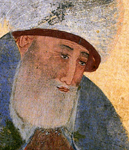 |
Mevlana Rumi
The Sufi Master |
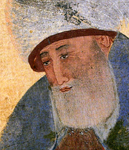 |
|
Mevlana Rumi -
the Saint, Master, Poet ... |
|
"Out beyond ideas of wrongdoing and rightdoing, there is a field. I
will meet you there.
When the soul lies down in that grass, the world is too full to talk
about." - Rumi
Jalal ad-Din
Muhammad Balkhi was one of the most imortant poets
and thinkers in the history of Turkey. He was born September 13th
1207 in Balkh, Khorasan, Persia, now northern Afghanistan. He
died December 17th 1273 in Konya, Türkey, where the
Mevlana
Museum today is located.
Jalal ad-Din
Muhammad Balkhi, is mostly called
Mevlana or
Mevlevi in Turkey. Mevlana means "our Master" and Mevlevi
"my Master".
In the west Mevlana is better known by the name: Rumi which
means, Anatolian.
This is
the only known portrait of Mevlana. It is preserved at
the Istanbul Municipality Directorate of Libraries and Museums:
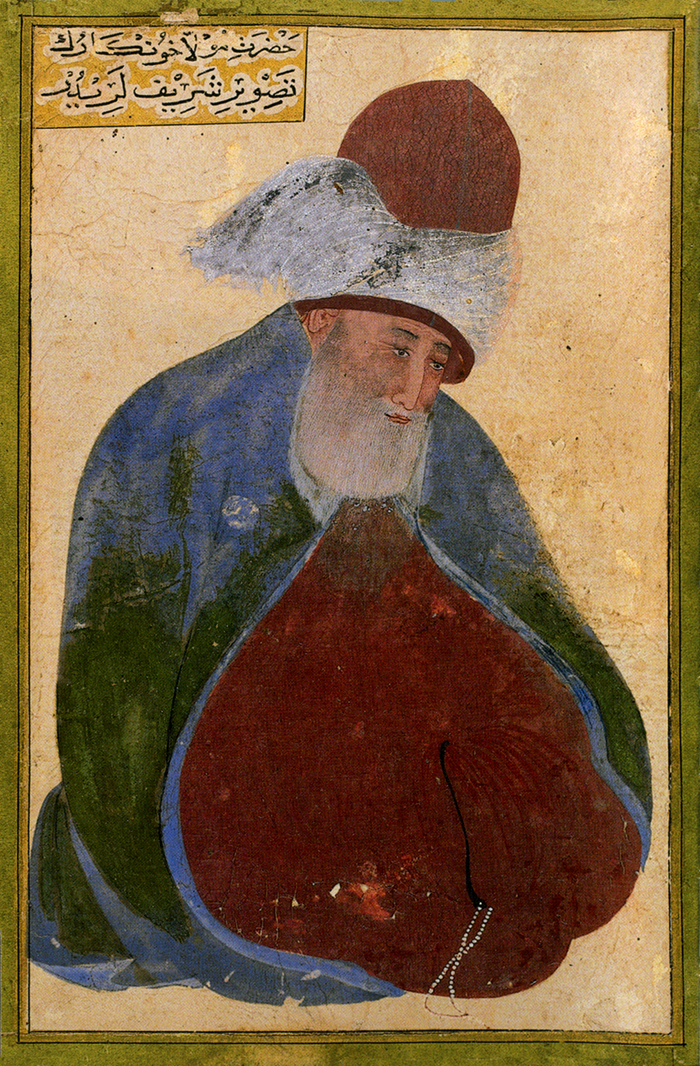
The words: "This is a
noble likeness of His Holiness Sovereign Mevlana"
are inscribed on the painting.
|
|
The Life of Mevlana
Rumi |
In Mevlana's days his birthtown Balkh
was already an ancient city and centre of Zoroastrianism. Marco Polo
describes Balkh as, "A noble and great city". Mevlana Rumi's father, Muhammed Bahaeddin was one of
Balkhs most eminent islamic scholars and was called, "Sultan of
Learned Men". Because of jealousy, pressure from the ruler
and the Mongol invasion, he left Balkh with
his family in 1211.
First to Nishapur then Bhagdad and other
cities.
Arriving at the city gate of Bhagdad, the father was asked where they had come from and
where they were going, Muhammed Bahaeddin replied, "We have come from God, and we are going to him. We have no other
command than from God."
From Damascus the family went to Anatolia and eventually settled
down in Konya. The local sultan went to lectures with Muhammed Bahaeddin
and after a lecture, he said, "My sincerity and belief increase
upon seeing this person's state. I tremble inside from his grandeur.
Upon seeing him, I am afraid!"
Muhammed Bahaeddin died in Konya 1231.
For a year Mevlana was
left without his mentor or shiekh. One
day his father's close freind Seyyid Burhaneddin arrived in Konya.
He initiated Mevlana into Sufism, and taught him
mysticism and asceticism.
Mevlana also studied in Aleppo and Damascus and returning to Konya
in 1240, he became a Sufi teacher himself. Due to his great
eloquence, theologocal knowledge and engaging personality, a group
of disciples soon gathered around him.
Mevlana Rumi was
teaching in the schools and mosques of Konya when he encountered the
dervish Muhammed Shemseddin Tebrizi, who came to Konya in 1244. In a
dream Shems was told, "I will make you a freind of one of the
mystics with whom you can talk." The elevated state of the
dervish made Mevlana seclude himself with Shems in the cell of
Selahaddin Zerkubi for six months. There he "began to discover the
dephts of knowledge of the consciousness of God. Here he undoubtly
percieved the perfection of absolute existence."
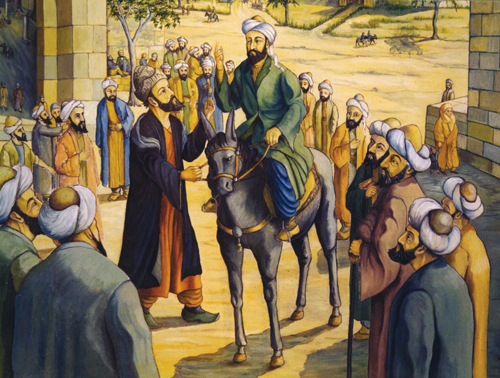
A depiction of
Mevlanas meeting with Shems
Because of problems
with jealousy conserning a wife and other matters, Shems was murdered and
thrown in a well. Overwhelmed by the loss of Shems, Mevlana withdrew
from the world to mourn and meditate. During this time he began to
manifest an extatic love of God that was expressed through sublimely
beautifull poetry, listening to devotional music and trance dancing.
Following Shems
death, in Selahaddin Mevlana recognized the manifestation there had been in Shems Zerkubi and ordered his students and companions to obey
him.
Selahaddin Zerkubi owned a jewley shop. One day Mevlana was passing by
and was attracted by the striking of a hammer on gold and began to
whirl. Selahaddin saw this and began to whirl with Mevlana.
Selahaddin remained with Mevlana for ten years. Upon his death
Mevlana wrote this poem:
|
"O, person,
the earth and the sky have cried at your separation!
For you, the heart was painted in blood, the mind and soul
grieved." |
Mevlana chose Chelebi Husameddin as his successor after Selahaddin's
death. Mevlana had great respect for Chelebi and was strongly
attached to him. One day Chelebi told Mevlana that he wished he would
produce a scripture of great importance. Mevlana then removed a
piece of paper from his turban on which was written the first 18
lines of the "Mesnevi" and said, "I will speek these if you will
write them down!" The main scripture of the Sufi order was from
then recorded in writing.
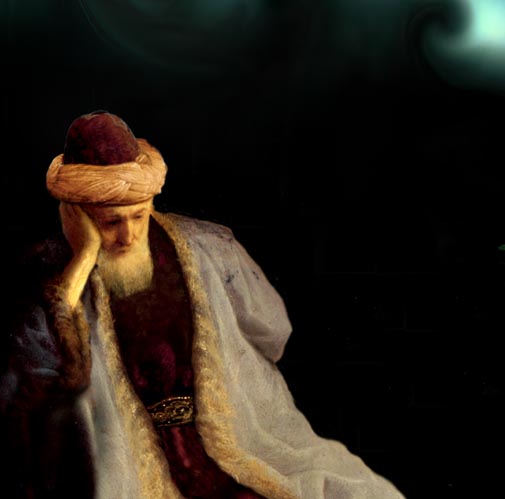
Mevlana Rumi in a
pensive mood
Mevlana Rumi died
on December 17th 1273 causing great sorrow in Konya. People of every
religion and creed wept for him. The Christians said, "He is our
Jesus", The Jews said, "He is our Moses". The Muslims
said, "He is the light and secret of the Prophet. He is the
endless sea of goodness".
It is reported that
after Mevlana's death, his cat neither drank or ate anything and
died on the seventh day. It is buried in the mausolaeum in a small
marble casket.
Mevlana's freinds
and admireres recognized the night of his death, when he met his
beloved God, as a night of union not of seperation. They called it
"Seb-i Arus" meaning "The Nuptial Night" or "The Wedding Night".
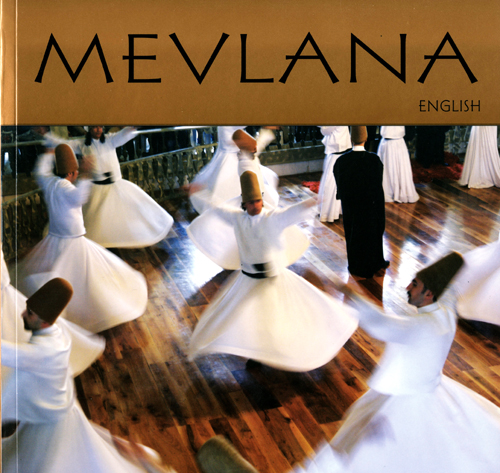
Excerpts from:
"Mevlana" by Naci Bakirci,
Silk Road Publications, Turkey 2010, ISBN
978-605-5629-34-2 |
|
Sema - the Sufi
Mevlevi Tradition |
|
Mevlana Rumi
passionately believed in the use of music, poetry and dance as a
path for reaching God. For Rumi, music helps devotees to focus their whole
being on the Divine. This is to be done so intensely, that the soul is
both destroyed and ressurrected.
It was from these ideas that the
now known practise of Sema, the dervish
whirling developed even further and took a ritual form which
has not changed since 17th century. Mevlanas
teachings became the basis for the Sufi order of the Mevlevis which
his son Sultan Walad organized.
The Mevlevi
Order is one of many Sufi orders that trace their original
precepts from the Islamic Profet Muhammed. A praktioner of
this tradition is a Sufi, belonging to different orders
evolved around a master like Mevlana Rumi.
Classic Sufi
scholars have defined Sufism as "A science whose objective
is the reparation of the heart and turning it away from all
else but God." It is a concept in Islam, defined as the
inner, mystical or esoteric dimension of Islam and an
inseprable part of Turkish custom, history, belief and
culture.
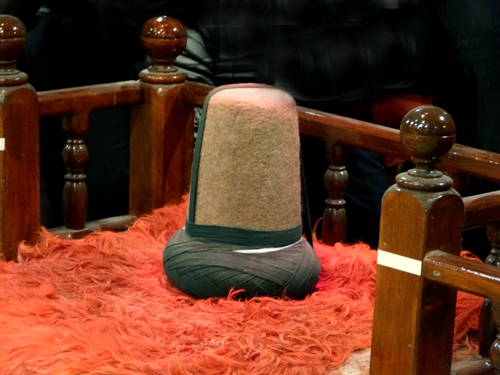
A Mevlevi headpece on a seat of red animal hide,
represents the seat of the
Sheik. The camel hair hat,
called "sikke" represents the tombstone of the
ego!
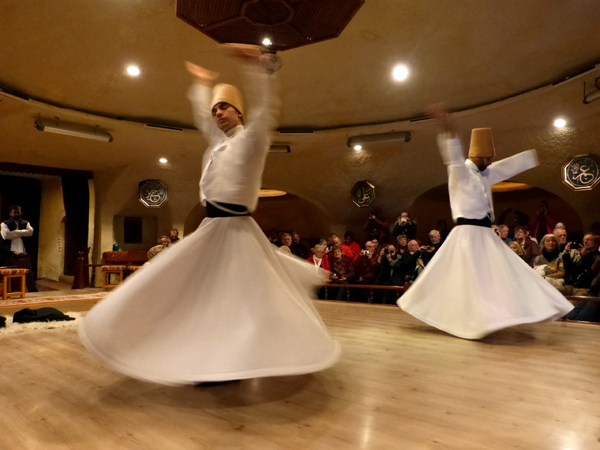
The
white skirt or cloak represents the burial shroud of the
ego.
|
|
Poetry |
| The love,
relationship and warmth toward all creation as expressed by Rumi is
a projection of a deeply rooted divine love. Rumi, whose nature was
intoxicated by love, embraced all of creation with a projection of
that love. He was involved in a dialogue with every creature, and
all of these were a result of his deep love and relationship with
God.
"Whoever you may be,
come!
Even though you may be
an infidel, a pagan, or a fire worshipper, come!
Our brotherhood is not one of dispair
even though you have broken
your vows of repentance a hundred times, come!"
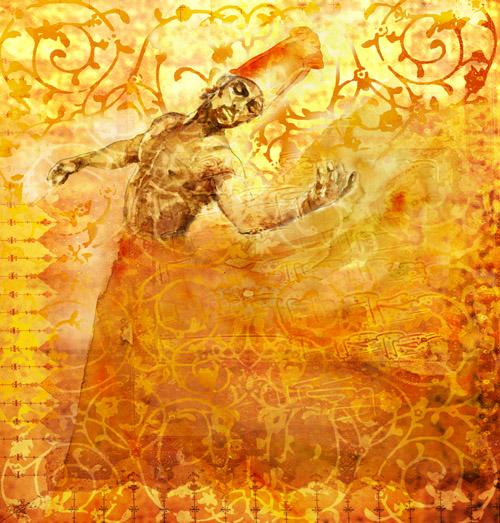
"Not Christian, Muslim
or Jew,
not Hindu, Buddhist, Sufi or Zen,
not any religion or cultural system.
I am not from the East or the West,
not out of the Ocean or up from the Ground,
not Natural or Etheral.
Not Composed of Elements at all.
I do not Exist, am not
an Entity
in this World or the Next,
did not descend from Adam or Eve
or any Origin Story.
My place is the placeless,
a trace of the traceless.
Neither Body or Soul.
I belong to the
Beloved.
I have seen Two Worlds as One
and that One call to and know,
First, Last, Outher and Inner -
only that breath breathing
Human Being ..."
..o0o..
"And still, after al
this time,
the Sun has never said to the earth,
"You owe me."
Look what happens with love like that.
It lights up the sky."
..o0o..
Rumi's seven pieces of advice
In generosity
and helping others - be like the river.
In compassion and grace - be like the sun.
In consealing others faults - be like the night
In anger and fury - be like the dead.
In modesty and humility - be like the soil.
In tolerance - be like the ocean.
Either appear as you are or - be as you apear.
..o0o..
Maxims from Rumi
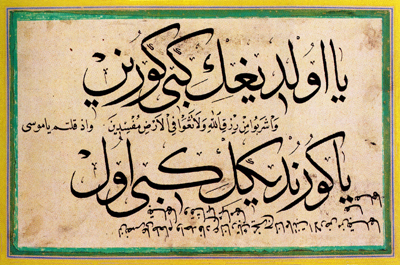
Text on the plaque:
"Either be as you are, or bee as you're seen."
"There is a likeness of man's exterior to all other men.
There is a likeness of man's interior with God."
"The
wars of men are like the quarrels of children;
both are meaningless and stupid."
"The
middle path is the way to wisdom."
"Before you sat anything, first listen."
"Don't allow your animal nature to rule your reason."
"O,
happy is the soul that sees its own faults."
"Know that a word, suddenly shut from the tongue, is like an arrow
shot from the bow.
Son, that arrow won't turn back on its way; you must damn the torrent
of its source."
"Hard work and earning are not obstracles to finding a treaure!
Continue to work hard, if it is Gods will, the treasure will find
you."
"The
moon stays bright, when it dosn't avoid the night."
..o0o..
From: "Rumi and His
Sufi Path of Love" edited by M. Faatih Cilak and Hüsien Bingül
www.tughrabooks.com
ISBN-13: 978-1-59784-078-1
Konya Mevlana Museum Guide by Naci Bakirei
|
|
mukti4u2@gmail.com |
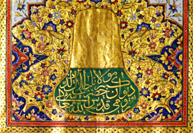 |
www.mukti4u2.dk |
mukti4u2.dk
►
created by
BP |